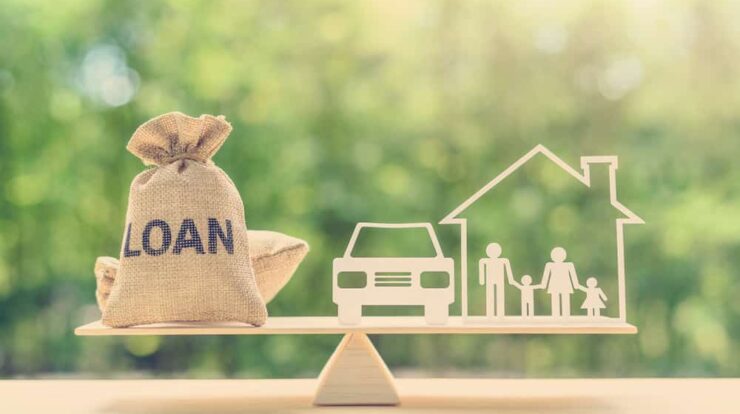
If you need a loan, you’ve probably already started investigating your options. The two types of loans—secured and unsecured—are quite popular choices for many people. The differences between the two, nevertheless, are not always obvious.
In conclusion, unsecured loans do not require collateral, but secured loans do. Since secured loans reduce the lender’s risk, they are also considerably simpler to qualify for and frequently have cheaper interest rates.
However, if you can’t pay back the money you borrow, it might not be the best option for you and might negatively impact your finances and credit.
The Process of Secured Loans
Borrowers with secured loans have access to a lump sum of cash that may be used for anything from home renovations to the purchase of a car or piece of real estate. Traditional banks, credit unions, internet lenders, car lots, and mortgage lenders are frequently sources of these loans.
Even though secured loans pose less of a risk to lenders, the application process often calls for a hard credit check; however, some lenders may let you prequalify with a simple soft credit inquiry. Additionally, although interest is charged on secured loan amounts in the same manner as other loans, borrowers may be able to acquire lower annual percentage rates (APRs) than on unsecured options.
When a borrower qualifies for a secured loan, the lender registers a lien against the collateral. The lender has the power to seize the collateral if the borrower defaults on the loan. The collateral value should be greater than or equal to the outstanding loan amount in order to improve the lender’s chances of getting their money back.
Different secured loan types
Numerous purposes can be served by secured loans. For instance, if you want cash for personal expenses, secured loan options include:
- loans for homes
- automobile loans
- Secured credit lines
- Cards with a guarantee
- Title loans for cars
- Loans under life insurance
- Pawnshop credit
- Poor credit loans
Mortgage loans and auto loans are secured by their respective assets, as was previously mentioned. Loans secured by shares operate differently from loans secured by savings. These loans are backed by money that is kept in a savings or certificate of deposit (CD) account at a bank or credit union. This kind of secured loan might aid in your credit development if you are unable to obtain approval for other loans or credit cards.
You might not have to provide a physical asset as security for a secured credit card or line of credit. Instead, the credit card company or lender can want a cash down payment as a security. For instance, opening a secured credit card can require several hundred dollars in cash. As a result of this cash payment, your credit limit has increased.
It’s always a good idea to start by utilizing a personal loan calculator to establish the optimal monthly payment amount, term length, and interest rate for your needs, regardless of the sort of personal loan you’re considering.
Small business loans
Both secured and unsecured business loans are possible. An example of a secured company loan is an equipment loan. Let’s say you run a construction business and need a new dump truck. You might finance it with an equipment loan, with the dump truck you desire as collateral. If you made your loan payments on schedule, you wouldn’t have to worry about losing the equipment you bought.
Regarding secured business loans, you should be aware that you can be required to offer a personal guarantee. This indicates that in the event that your business defaults on the loan, you accept responsibility for any liabilities incurred by the business. Therefore, if your business experiences cash flow issues, you risk being held personally liable for any defaulted loans.
Life insurance loans
You can borrow money via a life insurance loan secured by the policy’s cash value. The loan can then be repaid throughout the course of your life or deducted from the death benefit given to your dependents when you pass away. This loan is made available in combination with whole or variable life insurance policies that are permanent in nature.
Lending Options for Those with Poor Credit
bad credit A subcategory of secured loans is personal loans. These personal loans are available to borrowers with poor credit records. Similar to share-secured loans, secured credit cards, and secured lines of credit, lenders can offer personal loans to borrowers with bad credit, but they could also want cash as security. A lower credit score may result in a higher interest rate and/or cost on a secured loan for those with terrible credit.
How to Make a Secured Loan Application
Secured loans are typically provided by credit unions and traditional banks, auto dealerships, internet lenders, and mortgage lenders.
These five steps should be followed to get a secured loan:
- Check your credit report. Before applying for any loan, use a free online service or contact your credit card company to check your credit score. Once you are aware of it, you may use it to prequalify for a loan or take steps to increase your chances of being accepted.
- Check your spending plan. Examine your budget if you’re considering obtaining a secured loan to determine how much you can afford to pay each month.
- Examining prior debt responsibilities is usually required before taking on a new loan.
- Establish the value of potential collateral. When you’re prepared to seek a loan, estimate how much you may borrow by taking into consideration the value of your potential collateral, such as cash account balances, home equity, and any other valuable possessions. Banks do not, however, lend exactly what an item is worth; for example, presenting a $50,000 asset will not result in a $50,000 loan.
- Look around to find the best loan deal. After assessing your credit score and the amount you can comfortably borrow, start looking into lenders. Go to your current lender first if you’re thinking about acquiring a HELOC, or home equity loan. Look for lenders who provide prequalification without doing a thorough credit check if you want to apply for a secured personal loan.
- Submit an official application. Once a lender has prequalified you, submit a formal application. Lenders who offer secured loans almost always require an appraisal to determine the worth of your asset before approving the loan, in contrast to the unsecured loan application process.
What advantages and disadvantages do secured loans have?
Secured loans provide a number of benefits. You will nearly always be able to borrow more money, and you might be able to get a loan with a longer payback time and a lower interest rate. Additionally, you might be eligible to write off the interest you paid on some loans, such as mortgages.
You run the danger of losing your collateral if you don’t make your loan installments on secured loans. Additionally, except for home equity lines of credit, you are not allowed to utilize the funds however you see fit; the loan must be used for the intended purpose.




